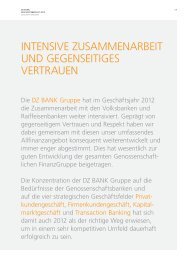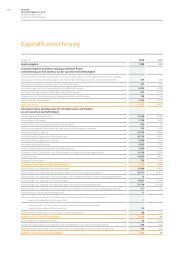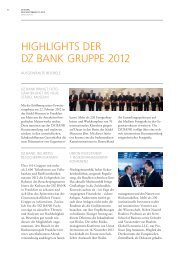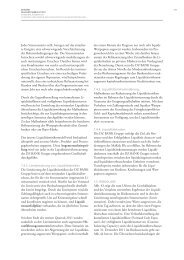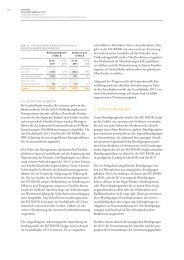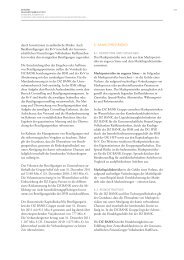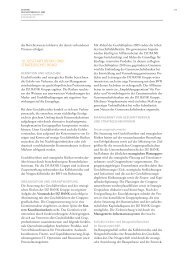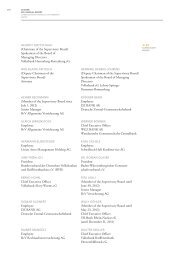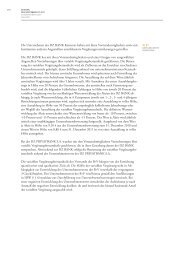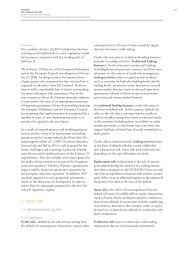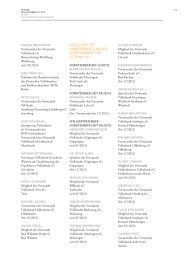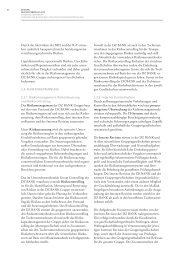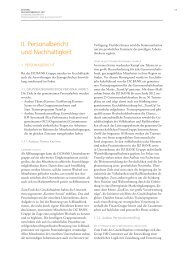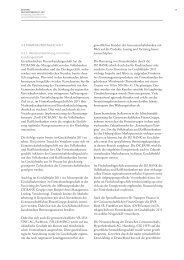trANSACtiON BANKiNG - DZ BANK Gruppe
trANSACtiON BANKiNG - DZ BANK Gruppe
trANSACtiON BANKiNG - DZ BANK Gruppe
You also want an ePaper? Increase the reach of your titles
YUMPU automatically turns print PDFs into web optimized ePapers that Google loves.
22 <strong>DZ</strong> <strong>BANK</strong><br />
2012 ANNUAL REPORT<br />
BUSINESS LINES<br />
TRANSACTION <strong>BANK</strong>ING<br />
The switch to SEPA represents both a challenge and<br />
a huge opportunity for the local cooperative banks.<br />
In the Transaction Banking business line, <strong>DZ</strong> <strong>BANK</strong><br />
therefore provided the cooperative banks with ongoing<br />
SEPA support in 2012.<br />
TRANSACTION <strong>BANK</strong>ING<br />
OVERVIEW<br />
For some time now, <strong>DZ</strong> <strong>BANK</strong> has been one of the<br />
driving forces behind the further development of<br />
transaction banking services in Germany and the rest<br />
of Europe. In this business line, <strong>DZ</strong> <strong>BANK</strong> offers<br />
cooperative banks a broad state-of-the-art range of<br />
products and services covering payments processing,<br />
international documentary business, cash, billing,<br />
and card services, the processing of securities and capital<br />
market products, and custodian bank services. In<br />
2012, <strong>DZ</strong> <strong>BANK</strong> expanded and optimized this range<br />
of services, for example in payments processing, where<br />
it implemented the increasing regulatory requirements<br />
and launched ProFi ZV.<br />
This initiative helps the cooperative banks realign<br />
their advisory services for corporate customers in relation<br />
to payments and card processing, allowing<br />
them to provide a holistic advisory service for their<br />
business customers in this regard. <strong>DZ</strong> <strong>BANK</strong> also<br />
expanded its card processing business for private customers<br />
and retailers. New opportunities will be<br />
presented in this business in the future, for example,<br />
by new mobile payment systems and by mini chipcard<br />
readers for mobile devices, which <strong>DZ</strong> <strong>BANK</strong> is<br />
offering in Germany in partnership with Equens and<br />
the Swedish company iZettle.<br />
SEPA MIGRATION<br />
For some time, a key issue in the Transaction Banking<br />
business line has been the preparation for what is<br />
known as the SEPA end date on February 1, 2014. This<br />
is in fact the date on which SEPA is planned to be<br />
completed and national payments processing systems<br />
will come to an end. As a network-oriented central<br />
institution, <strong>DZ</strong> <strong>BANK</strong> completed the technical switch<br />
to SEPA at an early stage. For example, since 2011,<br />
it has been processing around 5.3 million pension payments<br />
a month via SEPA. BICs and IBANs are already<br />
shown on the bank cards of private customers.<br />
However, this issue has not yet found its way on to the<br />
agenda for many corporate customers. The majority<br />
of them have not yet addressed the issue of migrating<br />
to the new system.<br />
The data for bulk payments demonstrates the extent of<br />
the SEPA migration backlog at corporate customers<br />
that still need to switch their accounting and payments<br />
processing systems. In 2012 alone, <strong>DZ</strong> <strong>BANK</strong> in conjunction<br />
with its service provider in this area of business,<br />
Equens, processed around 4.2 billion transactions.<br />
The proportion of SEPA payments was less than<br />
4 percent. Progress was particularly slow in the conversion<br />
of direct debits, which account for the bulk<br />
of domestic transactions in the cooperative financial<br />
network. Considerably fewer than 1 percent of the<br />
direct debits processed by <strong>DZ</strong> <strong>BANK</strong> in 2012 were<br />
SEPA direct debits.
<strong>DZ</strong> <strong>BANK</strong><br />
2012 ANNUAL REPORT<br />
BUSINESS LINES<br />
TRANSACTION <strong>BANK</strong>ING<br />
23<br />
Supporting customers – exploiting opportunities<br />
Many corporate customers will also have a significant<br />
need for information and support in relation to the<br />
migration to SEPA. This applies particularly in respect<br />
of the integration of SEPA direct debit mandates into<br />
payments processes. This means that the migration to<br />
SEPA represents an even greater opportunity for the<br />
cooperative financial network to prove itself as an expert<br />
partner in corporate banking and solution provider for<br />
payments processing, increase customer loyalty, and<br />
generate additional payments processing business. In<br />
2012, <strong>DZ</strong> <strong>BANK</strong> responded to the situation by creating<br />
a package of services covering all relevant aspects<br />
of migration to SEPA and offering these services to the<br />
local cooperative banks. This will enable the cooperative<br />
banks to offer their corporate customers a comprehensive<br />
support service for conversion of their systems<br />
to SEPA.<br />
SEPA Navigator<br />
One of the core elements in this regard is SEPA Navigator,<br />
which was developed by <strong>DZ</strong> <strong>BANK</strong> in collaboration<br />
with the local cooperative banks and launched in August<br />
2012. The cooperative banks can integrate this system<br />
into their websites free of charge. SEPA Navigator is<br />
aimed first and foremost at corporate customers of the<br />
cooperative banks and helps them draw up a reliable<br />
overview of the status of SEPA implementation in their<br />
respective organizations. At the same time, the corporate<br />
customers are provided with sound advice on carrying<br />
out the migration to SEPA. SEPA Navigator also gives<br />
the cooperative banks a tool to help them determine<br />
the specific requirements of corporate customers in relation<br />
to the migration to SEPA and identify those corporate<br />
customers in immediate need of assistance. SEPA<br />
Navigator also includes links allowing customers to<br />
make direct contact with their relationship manager if<br />
they have specific questions and/or problems.<br />
In addition to the corporate customer version of SEPA<br />
Navigator, <strong>DZ</strong> <strong>BANK</strong> also offers the cooperative<br />
banks a customer advisor version, which the banks can<br />
use as an aid in situations where they are providing<br />
specific customer advice.<br />
SEPA Navigator has been very well received by the<br />
cooperative banks. By the end of 2012, the majority of<br />
local cooperative banks had integrated it into their<br />
websites, thereby making it available to their corporate<br />
customers.<br />
In the third quarter of 2012, <strong>DZ</strong> <strong>BANK</strong> set up a<br />
SEPA hotline to complement SEPA Navigator. This<br />
hotline serves as the central point of contact for the<br />
coordination of all internal technical, process-related,<br />
and organizational issues that the cooperative banks<br />
may have in connection with the migration to SEPA.<br />
The SEPA hotline has also met with a good response<br />
from the local cooperative banks, which are making<br />
increasing use of this option.<br />
<strong>DZ</strong> <strong>BANK</strong> is also providing support for the cooperative<br />
banks in the form of materials, such as checklists<br />
for corporate customers, letter templates, and model<br />
presentations, as well as offering training sessions. In<br />
2012 alone, experts from <strong>DZ</strong> <strong>BANK</strong> held approximately<br />
90 employee training sessions at local cooperative<br />
banks and also organized 100 corporate customer<br />
events jointly with these banks in connection with<br />
the switch to SEPA.<br />
Practical solutions<br />
During 2012, <strong>DZ</strong> <strong>BANK</strong> carried out work on practical<br />
solutions for the SEPA migration to enable the local<br />
cooperative banks to provide their corporate customers<br />
with optimum support in this regard. This work was<br />
based, among other things, on the results from two<br />
dialog forums on the subject of mandate services organized<br />
by <strong>DZ</strong> <strong>BANK</strong> with payments processing experts<br />
from the local cooperative banks. These results set out<br />
specific requirements to help corporate customers with<br />
the switch to the SEPA direct debits system. This included,<br />
for example, the provision of electronic form<br />
templates for SEPA mandates, the import and export<br />
of mandate information, and also the conversion of<br />
payment orders from the DTAUS file format to SEPA<br />
payment orders. One of the main challenges was and<br />
remains the need to meet the different individual<br />
requirements, for example, of medium-sized companies<br />
or other business customers. This is one of the key<br />
prerequisites for ensuring that the migration to SEPA<br />
functions well for all corporate customers. It is a<br />
significant challenge for the Transaction Banking<br />
business line in 2013.



